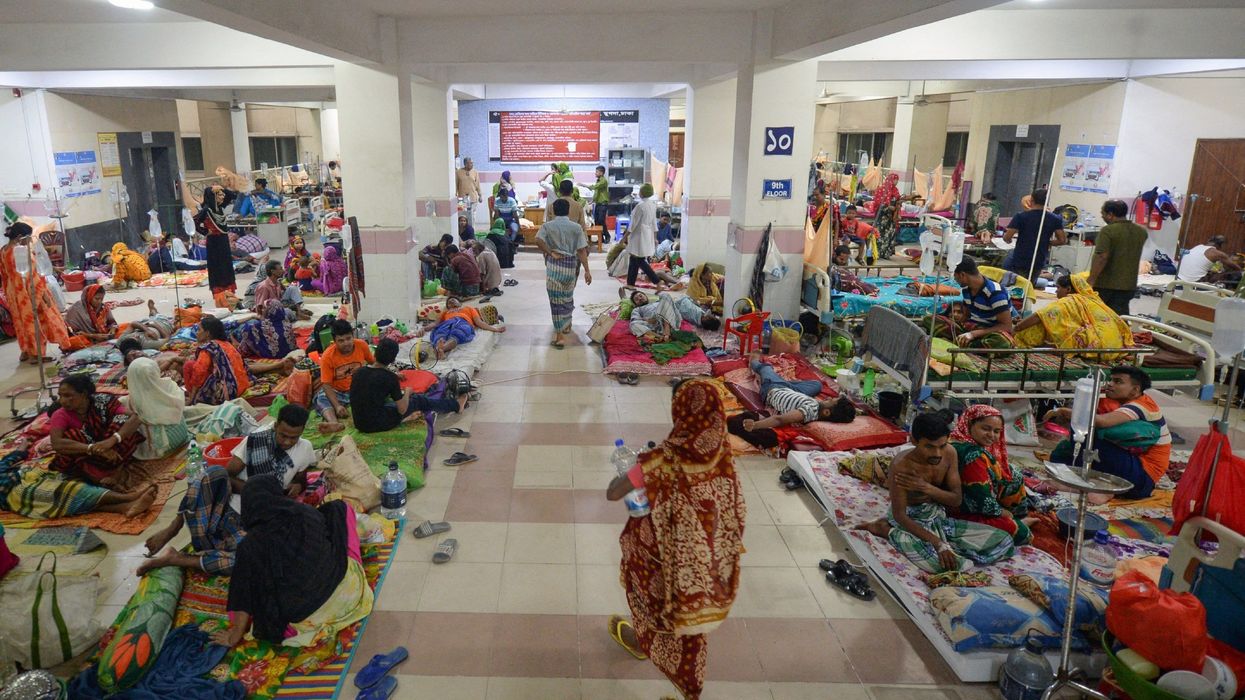The authorities in Bangladesh have declared the current outbreak of dengue fever as the most severe in the country's history with the fast-spreading infections from rural areas putting additional strain on Dhaka's already overwhelmed hospital system.
The surge in dengue infections since April has overwhelmed hospitals, leading to overflowing corridors and a shortage of beds. The epidemic has intensified in recent times, with expectations of a rising death toll as the rainy season in Bangladesh extends for more than three additional months.
This year, over 187,725 people have tested positive for dengue, resulting in more than 900 deaths in a population exceeding 170 million. Currently, there are 10,470 dengue patients receiving treatment in hospitals. The New York Times reported.
The mosquito-borne virus has caused over 900 deaths this year, prompting rural residents to seek treatment at already strained hospitals in Dhaka, the capital.
Bangladesh is experiencing its most severe dengue fever outbreak in history, with infections rapidly spreading from rural areas, further burdening the overwhelmed hospital system in Dhaka.
The Bangladeshi authorities reported on Monday (25), 909 dengue-related deaths this year through Sunday, a stark increase from the 281 deaths recorded in all of 2022.
Dr Khalilur Rahman, a director at the Shaheed Suhrawardy Medical College and Hospital, noted that hundreds of patients were arriving in Dhaka from other areas.
He pointed out that certain hospitals in Dhaka were experiencing shortages of intravenous fluids required for rehydrating dengue patients.
Additionally, pharmacists were increasing the prices of IV treatment due to rising demand, exacerbating the crisis.
The mosquito-borne viral infection has now spread to all 64 districts of the country, the WHO reported.
Dengue is a common ailment in tropical regions, causing symptoms such as severe headaches, nausea, muscle, and joint pain, and, in some cases, death.
Last week the WHO said that a combination of factors, including climate change, has contributed to the global increase in dengue cases, affecting millions of people.
The warming planet has led to more extreme weather patterns in south Asia, resulting in wetter and hotter monsoon seasons, which provide an ideal breeding environment for Aedes mosquitoes, the carriers of the virus.
The crisis in Bangladesh continues to deteriorate daily, particularly in a city burdened by inadequate infrastructure. Dhaka, with its population of 12 million, is densely populated, and a significant portion resides in slums with poor sanitation conditions.
The issue of clogged drainage systems has led to the accumulation of standing water, creating an ideal breeding environment for mosquitoes.
Tedros Adhanom Ghebreyesus, the director-general of WHO said in a recent news briefing that while cases were starting to decline in Dhaka, they were on the rise in other parts of the country.
He also mentioned the WHO's efforts to address the situation: "We have trained doctors and deployed experts on the ground. We have also provided supplies to test for dengue and support care for patients." Despite these efforts, health experts are concerned that fatalities may increase further, given that more than three months of Bangladesh's rainy season remain.
He additionally outlined the WHO's initiatives to tackle the situation, including the training of medical professionals and the deployment of experts to the affected areas. He said the organisation has also furnished essential supplies for dengue testing and patient care.
Nevertheless, experts in the field of health express apprehension that the number of fatalities could rise further, considering that Bangladesh's rainy season still extends for over three months.
To date, a total of 187,725 individuals have tested positive for dengue infection this year across the nation, which is inhabited by over 170 million people.
Health authorities have reported that 10,470 patients are currently receiving treatment for dengue in various hospitals.
Furthermore, the infection has extended into the densely populated camps housing Rohingya refugees, located just outside the coastal city of Cox's Bazar. Last year, these camps recorded more than 15,000 cases of dengue, resulting in at least six fatalities.
Bangladesh has been grappling with dengue infections for over two decades, yet the authorities lack adequate preventive measures, said Dr Be-Nazir Ahmed, a specialist in public health.
He expressed concern about the widespread spread of dengue throughout the country and fears that rural areas may witness a more substantial impact in the future if immediate containment measures are not implemented.




